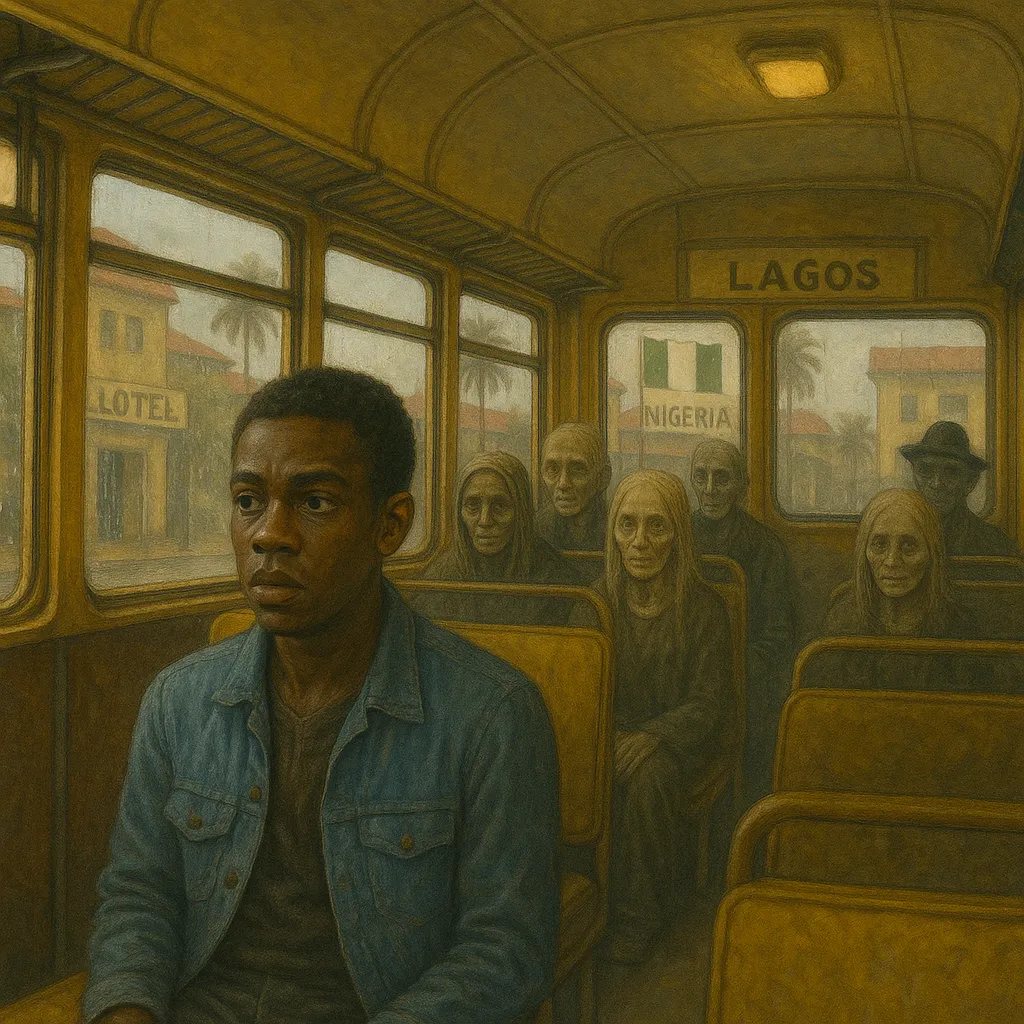We were new to the motor park, but there was just one name we kept hearing among the conductors and food sellers.

“Who is Madam Onome?” I asked my cousin, Chike, as we sat on the wooden bench, waiting for the last bus to Obudu.
Before he could answer, the woman frying akara nearby chuckled. “Na only you never sabi am. That woman na legend for this park. She dey control this last bus like say na private jet.”
That caught my attention. A woman controlling the last bus to Obudu like a private jet? I was curious.
As fate would have it, just then, a short, heavily built woman in an oversized Ankara wrapper and rubber slippers stormed into the park with the confidence of a general. She balanced a whistle in her mouth, waved her scarf like a flag, and shouted, “Who dey go Obudu? Last bus full up sharp-sharp! Na now or never!”
“Na she be that,” the akara seller whispered, smiling like she had just shown me a lion in a zoo.
Chike leaned close and said, “If you miss this bus, you go wait till tomorrow morning. That woman dey always get full bus even when others dey beg for passengers.”
I watched as passengers ran toward her, their bags swinging wildly. Within five minutes, the rusty eighteen-seater bus was packed to capacity. Chike and I rushed over, afraid we’d be left behind.
“Two last seats, Mama Onome!” the conductor shouted, pointing at us.
We scrambled in and got the last row — uncomfortable, narrow, and directly above the back tire that made the whole seat bounce like a trampoline.
The bus roared to life. It wheezed, coughed, and finally started moving, slowly making its way out of the park. That was the beginning of the most unforgettable journey of my life.
The bus was stuffy. A mix of fried akara, sweat, and engine oil hung in the air. But it wasn’t the smell that made it memorable — it was the characters inside.
In front of us sat a man who claimed to be a prophet. He kept yelling Bible verses and warning us to “repent before we reach the mountain.” Every time the bus hit a pothole, he shouted, “That’s a sign! God is speaking!”
Beside me was a woman with a crying baby. She had given the child everything from breast milk to powdered milk, gala, and Fanta. The baby still wailed like it had personal beef with the road to Obudu.
The driver, a slim man with tribal marks and tired eyes, was clearly struggling to stay awake.
“Oga,” Chike said, leaning forward, “make we rest small now. You don dey drive since morning.”
Madam Onome, who had been sitting right behind the driver like a hawk, hissed. “Driver no go rest till we reach! Na why I dey follow am go Obudu. He no dey get sense if I no dey.”
Nobody argued with her. Even the prophet went quiet.
As we left the bustling streets and entered the lonely, dusty highway that led to Obudu, the scenery changed. Tall trees waved as we passed, and the sky darkened. Night was fast approaching.
Suddenly, the bus jerked and came to a halt in the middle of nowhere.
“Oga, wetin happen?” Madam Onome barked.
The driver stepped down and opened the bonnet. A puff of smoke escaped like a secret trying to get away.
“Radiator don burst,” he muttered.
Madam Onome shook her head, took off her scarf, tied it around her waist, and came down. “Everybody, make una relax. No be the first time.”
I was shocked. No panic. No shouting. She simply brought out a yellow jerrycan and signaled a passing okada.
“Tell Musa say I dey here. He go bring the other bus. Tell am make e bring extra water and plug too,” she instructed like a soldier in battle.
Within thirty minutes, another bus arrived with Musa, her assistant. Within another hour, we were back on the road.
We finally got to the foot of the Obudu hills around 1:15 a.m.
“Everybody come down,” Madam Onome announced. “From here na climb small.”
I thought she was joking until she grabbed her bag and started walking.
“I don tell una say this woman be legend,” Chike whispered.
We followed her up a narrow path, with our bags slung on our backs. The stars lit the sky, and the air grew colder. All of a sudden, I saw why people kept talking about this route. The road curved like a ribbon around the hills, and the silence of the night was broken only by chirping crickets.
Halfway up, the prophet slipped and nearly fell off the edge. It was Madam Onome who caught him.
“You see your life?” she said. “You dey talk Bible, but no dey watch road.”
We burst into laughter even the baby stopped crying for the first time.
By 2:30 a.m., we finally arrived at a resting lodge halfway up the hills. We were dirty, tired, and hungry, but somehow, the adventure made it all worth it.
Madam Onome stood by the door, counting everyone as they entered.
“Na so I take carry una reach here. From here, na taxi go carry una go resort,” she said with pride.
I looked around, smiled, and whispered to Chike, “This wasn’t just a bus ride… it was a journey.”
He nodded. “And she’s not just a bus coordinator… she’s the queen of the last bus to Obudu.”
To this day, I’ve never taken another trip like that. Whenever I think of courage, chaos, and an unforgettable journey, I remember the woman in an Ankara wrapper who ruled the road like a queen Madam Onome and the last bus to Obudu.
Image generated with AI